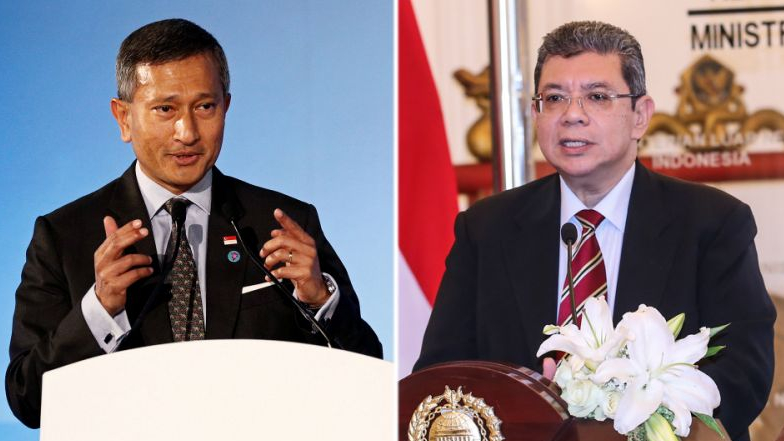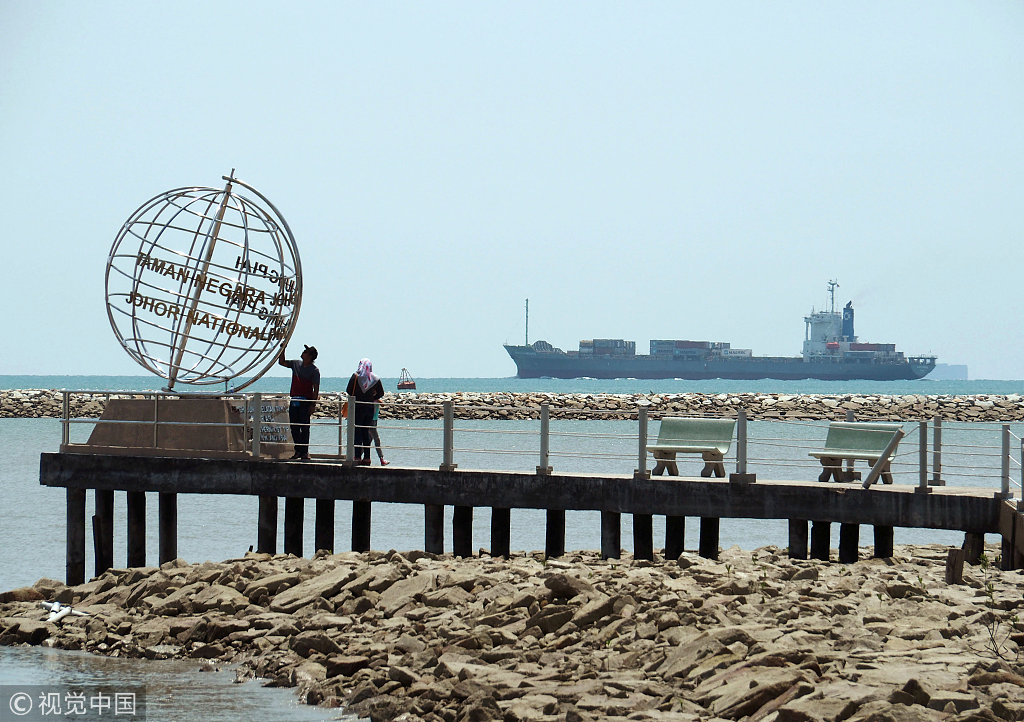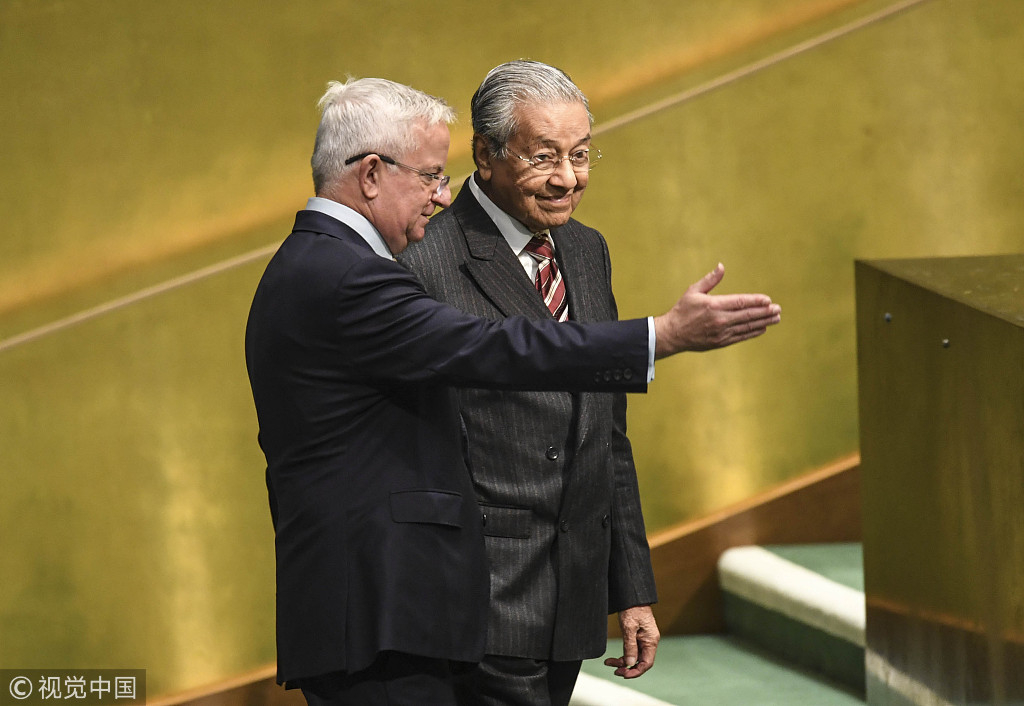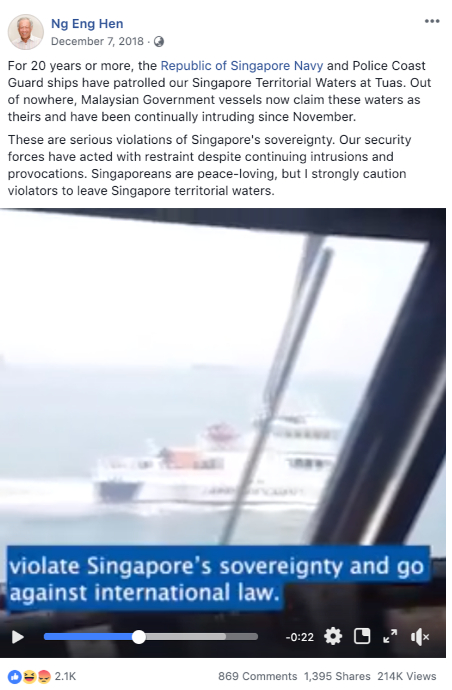
Politics
15:37, 19-Jan-2019
Malaysia-Singapore dispute: Tactical diversion or a political tool?
By Derek Cai

An axiom in international relations is that there are no permanent friends or enemies, only permanent interests. And interests can vary across timelines.
A series of disagreements between Singapore and Malaysia have strained their once relatively pleasant ties over the past few months.
But bubbling under the surface of the well-publicized disputes are questions about whether one or both of these countries are planting false flags, and using these disputes for political gains.
Singapore's first parliamentary seating in 2019 saw a salvo of questions aimed at the country's foreign affairs minister, Balakrishnan. Members of the assembly wanted updates on the dispute with Malaysia, which spans areas including airspace, food security, and maritime boundaries, among others.
The republic's minister for defense also reiterated the country's position with regard to the maritime intrusions, saying they would like to resolve conflicts through discussions and peaceful means, but that Singapore will “continue to protect and assert our sovereignty over (Singapore Territorial Waters), and the waters within Singapore port limits."
On October 25 last year, Malaysia expanded the port boundaries of its southern state, Johor, into Singaporean territorial waters. Over the next few weeks, Malaysian vessels repeatedly entered the contested area without concession to the lion city.
This became an overture to more clashes ahead, including Putrajaya's claim that Singapore made the unilateral decision to install a landing system at Seletar airport which would require descending planes to fly over Johor, a move which Malaysia said would inconvenience residents in the vicinity.

A container ship enters the Singapore Strait for the Strait of Malacca, as tourists stand at mainland Asia's Southern most point in Johor, Malaysia, November 12, 2016. /VCG Photo
A container ship enters the Singapore Strait for the Strait of Malacca, as tourists stand at mainland Asia's Southern most point in Johor, Malaysia, November 12, 2016. /VCG Photo
Singapore, in retaliation to the unwelcome intrusion and assertions, launched a fierce broadside against its northern neighbor.
In a Facebook post in December, Defense Minister Ng said Singapore has for more than 20 years patrolled its territorial waters. “Out of nowhere, Malaysia government vessels now claim waters as theirs and have been continually intruding since November. These are serious violations of Singapore's sovereignty,” he said.
Putrajaya and Singapore have however subsequently said that neither want an escalated conflict, but said both would take appropriate actions to defend their “sovereignty," a term all the member states of the regional bloc ASEAN (Association of Southeast Asian Nations) champions.
“I think what Singapore is doing is trying to draw a line in the sand in order to head off what it sees as Malaysia's more assertive stance on various bilateral matters,” said Oh Ei Sun, a senior fellow in the Singapore Institute of International Affairs.
Oh, who was the political secretary to Malaysia's former prime minister Najib Razak from 2009 to 2011, added that the two countries have over the years developed an “unofficial pattern of resolving such disputes.”
“[It begins with] initial loud verbal exchanges followed by bilateral negotiations, failing which would be submitted to international adjudication or arbitration,” Oh told CGTN, in what appears to be a reference to Pedra Branca, an embattled island near the eastern entrance of the Singapore strait.

Malaysia's Prime Minister Mahathir bin Mohamad arrives to speak during the General Debate of the 73rd session of the General Assembly at the United Nations in New York on September 28, 2018. /VCG Photo
Malaysia's Prime Minister Mahathir bin Mohamad arrives to speak during the General Debate of the 73rd session of the General Assembly at the United Nations in New York on September 28, 2018. /VCG Photo
Malaysia and Singapore were wrestling for control over the island, and the case was brought before the International Court of Justice (ICJ) in 2008. Singapore won. In 2017, Malaysia applied to reopen the case but subsequently withdrew their application when a new government took over.
In May last year, political party Pakata Harapan, led by 93-year-old Mahathir Mohamad, defeated Najib Razak and won Malaysia's general election. Mahathir's premiership was all but guaranteed and would mark his second stint as the prime minister of the Southeast Asian nation.
What came after that was sweeping reform across the country. Its foreign policy also shifted to a more combative, but still neutral stance. But it is common for most democratic countries to amend policies after a change in administration.
The two founding members of ASEAN are no strangers to neighborly spats. Anchored throughout their history are bilateral issues such as Pedra Branca, or Malaysia's petition to raise the price of raw water that it sells to Singapore — all of which were brought back to center stage last year.
During Mahathir's first term as prime minister between 1981 to 2003 — the longest period anyone has ever held the appointment in office — these issues frequently marred relations between the two neighbors.
And while the revival of these incursions has unearthed decades-old disputes of structural nature, some of the public have argued that the timing of the disputes is suspect.
Even some politicians in Singapore have questioned the reason for the recent dispute, asking if this was just a way of distracting the Malaysian public from a bevy of domestic issues.
Singapore's Speaker of Parliament Tan Chuan-Jin in December shared a two minute video on Facebook which posed questions like, “Why is Malaysia doing all this? Pressure tactics? To distract attention from domestic issues? To test the mettle of our leadership? To destabilize Singapore?” He urged all Singaporeans to share the video.

Screen capture of Defence Minister Ng's Facebook post on defending territorial waters and sovereignty.
Screen capture of Defence Minister Ng's Facebook post on defending territorial waters and sovereignty.
But some political watchers have dismissed that, saying that those accusations are themselves distractions from what is really important. “Malaysia is so preoccupied with domestic political infighting, and cannot afford to waste time picking unnecessary fights with Singapore,” said Dr. Oh, who is himself Malaysian.
“With regard to Singapore, [Mahathir] is basically rehashing many of his well-known positions on a series of bilateral matters,” Oh added.
Conversely, some observers have decried the dispute as an opportunity for the city state's ruling People's Action Party (PAP), which has been in power since the republic gained independence in 1965, to flex its political muscles.
With the Singapore general elections rumored to be slated for 2019, some observers have said that the city state is sharpening its tone on sovereignty and strength to win confidence from voters heading to the booths sometime later this year.
According to the constitutions, the Parliament of Singapore's maximum term is five years. The ruling party saw its popularity wane in the 2011 general election, evident by its lowest-ever 60 percent votes. It was also the first year all the constituencies in Singapore were contested by an opposition party.
In the last election in 2015, however, they clawed back an extra 10 percent of the votes. But even then, some observers have argued that the sun is setting on the ruling party, and the 2011 general election has made the government less gun shy about rousing jingoistic sentiments.
Whether or not these disputes are mere cloaks and daggers will likely remain questions unanswered. But with the shifting fault lines in the region's political scene, it is reasonable to expect more interesting tides in choppier waters.
(Cover: Singapore's Minister for Foreign Affairs Vivian Balakrishnan (L) and Malaysia's Minister for Foreign Affairs Saifuddin Abdullah (R). /Reuters Photo)

SITEMAP
Copyright © 2018 CGTN. Beijing ICP prepared NO.16065310-3
Copyright © 2018 CGTN. Beijing ICP prepared NO.16065310-3